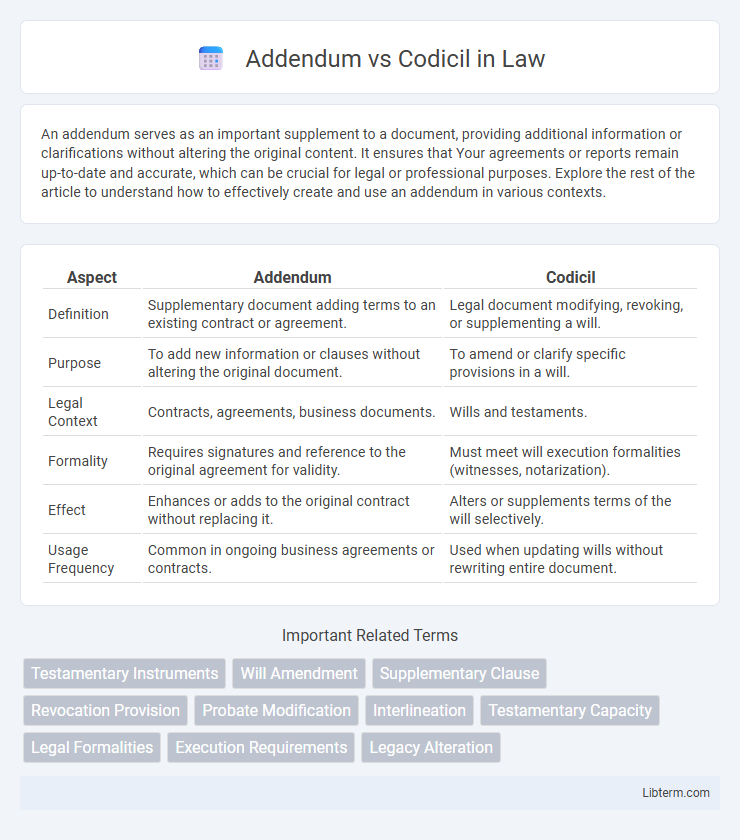An addendum serves as an important supplement to a document, providing additional information or clarifications without altering the original content. It ensures that Your agreements or reports remain up-to-date and accurate, which can be crucial for legal or professional purposes. Explore the rest of the article to understand how to effectively create and use an addendum in various contexts.
Table of Comparison
| Aspect | Addendum | Codicil |
|---|---|---|
| Definition | Supplementary document adding terms to an existing contract or agreement. | Legal document modifying, revoking, or supplementing a will. |
| Purpose | To add new information or clauses without altering the original document. | To amend or clarify specific provisions in a will. |
| Legal Context | Contracts, agreements, business documents. | Wills and testaments. |
| Formality | Requires signatures and reference to the original agreement for validity. | Must meet will execution formalities (witnesses, notarization). |
| Effect | Enhances or adds to the original contract without replacing it. | Alters or supplements terms of the will selectively. |
| Usage Frequency | Common in ongoing business agreements or contracts. | Used when updating wills without rewriting entire document. |
Understanding Addendum and Codicil: Key Differences
An addendum is a document added to an original contract or agreement to modify, clarify, or add new terms without altering the main body, while a codicil specifically refers to an amendment or addition to a will that changes, deletes, or adds provisions. Addenda are commonly used in business contracts for updates or corrections, whereas codicils are legal tools designed to update testamentary documents without rewriting the entire will. Understanding these differences is crucial for effective legal documentation and estate planning.
Definition of an Addendum
An addendum is a supplementary document added to a primary legal agreement or contract to include additional terms, clarify existing provisions, or update information without altering the original text. Unlike a codicil, which specifically modifies or revokes portions of a will, an addendum applies broadly to various legal documents such as contracts, leases, or policies. It serves as an official extension ensuring all parties acknowledge and consent to the new or revised clauses appended after the initial agreement.
Definition of a Codicil
A codicil is a legal document used to modify, revoke, or explain specific provisions of an existing will without rewriting the entire document. Unlike an addendum, which adds new information or clarifications to a contract or document, a codicil specifically addresses changes to a testamentary instrument. Codicils require the same formalities as wills, such as witness signatures, to ensure their validity in probate court.
When to Use an Addendum
An addendum is used to provide additional information or clarify terms in an existing contract without altering the original agreement's primary content. It is ideal when parties need to update or expand specific provisions without rewriting the entire document. In contrast, a codicil modifies or revokes parts of a will, making an addendum unsuitable for testamentary changes.
When to Use a Codicil
A codicil is used to make specific, minor changes or additions to an existing will without rewriting the entire document, such as updating beneficiaries or appointing new executors. It is appropriate when the modifications are limited and do not significantly alter the primary terms of the will. For more extensive revisions or when establishing new legal terms, creating a new will is often preferable to ensure clarity and legal validity.
Legal Implications of Addendums
Addendums serve as formal additions that modify the terms of existing contracts or agreements without replacing the original document, thereby preserving the initial legal framework. Their enforceability hinges on clear language and mutual consent between parties, making them critical tools for adapting contractual obligations while minimizing disputes. Courts typically uphold addendums when they are properly documented, signed, and specify which provisions are altered, ensuring that the legal integrity of the original contract remains intact.
Legal Implications of Codicils
Codicils serve as legal documents that modify, explain, or revoke specific provisions within an existing will, carrying binding authority under probate law. Unlike addendums, which generally supplement contracts or agreements without altering primary terms, codicils require formal execution, often including witnesses and notarization, to ensure validity. Failure to properly execute a codicil can lead to disputes in estate distribution, highlighting its critical role in legal estate planning and testamentary intent.
Addendum vs Codicil: Common Use Cases
An addendum typically serves to add information or clarify terms without altering the core document, commonly used in contracts, leases, or agreements to include supplementary details or updates. A codicil modifies or revokes specific provisions in a will, providing legal adjustments without rewriting the entire testament. Both addendums and codicils facilitate document changes, but addendums apply broadly to contracts and agreements, while codicils specifically address testamentary amendments.
Drafting Tips for Addendums and Codicils
When drafting addendums and codicils, ensure clarity by explicitly referencing the original document and specifying the changes or additions to avoid ambiguity. Use precise language and legal terminology tailored to the context, whether modifying a contract (addendum) or a will (codicil). Limit the scope of the amendment to maintain the integrity of the original document and facilitate easier enforcement.
Choosing Between an Addendum and a Codicil
Choosing between an addendum and a codicil depends on the nature of the document and the amendments required. An addendum serves best for adding new information without altering the original terms, commonly used in contracts to supplement details. A codicil modifies, revokes, or adds provisions to an existing will, making it the preferred choice for legal changes in testamentary documents.
Addendum Infographic

 libterm.com
libterm.com